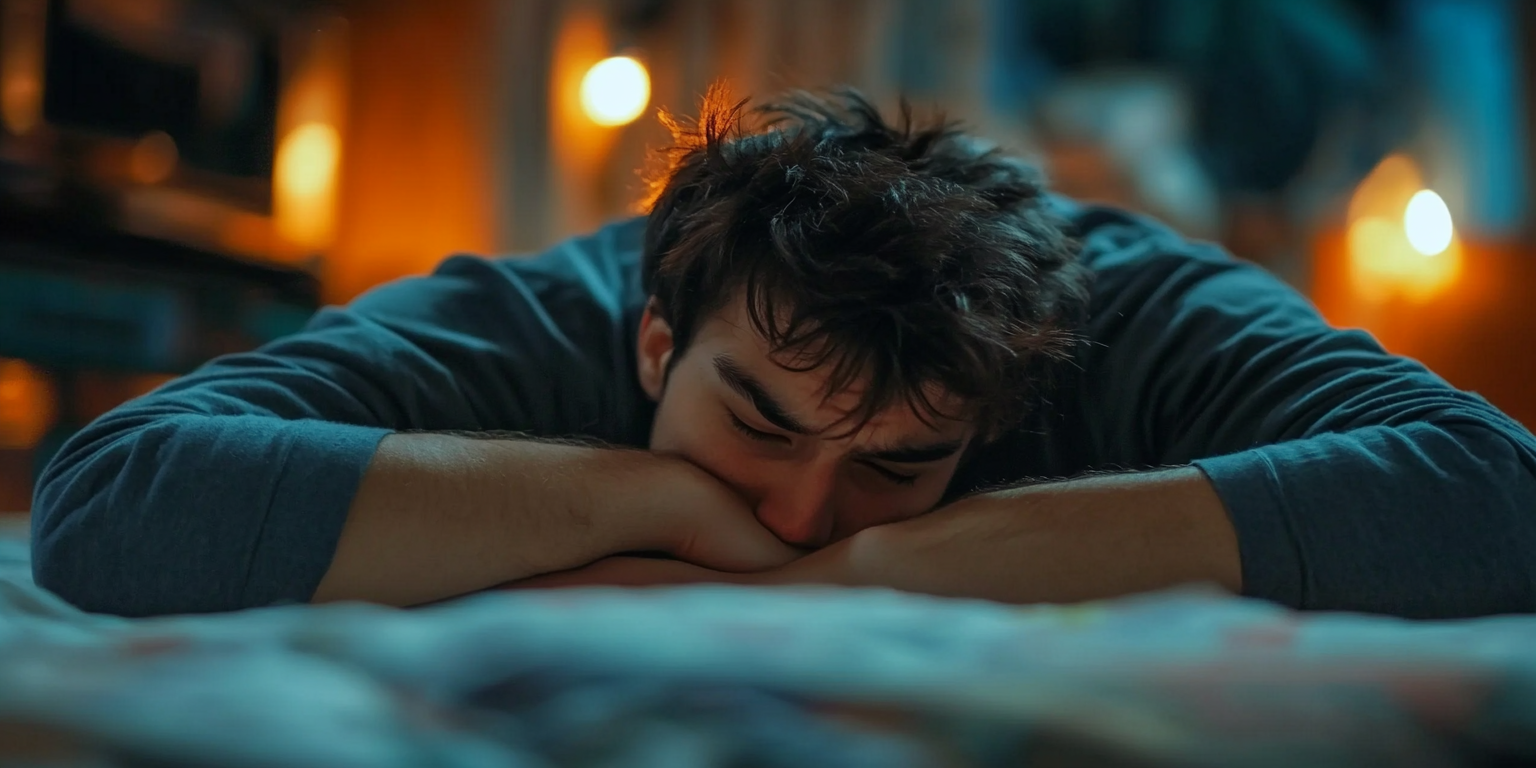Understanding Nocturnal Panic Attack: Waking Up in Panic
You’re sound asleep when a jolt of intense fear rips you awake. Your heart pounds, your chest feels tight, and for a moment you wonder if you’re dying. This overwhelming, intense feeling of terror is a hallmark of these episodes. If that scene feels familiar, you may have experienced a nocturnal panic attack—a surge of panic that strikes from a dead sleep and feels just as frightening as a daytime episode. Many people experience nocturnal panic attacks during sleep, which can be extremely distressing and disruptive. After such an episode, it’s common to feel anxious or unsettled even after the initial panic subsides.
Experts estimate that up to 70 percent of people with diagnosed panic disorder also have panic attacks at night. But you don’t need a formal panic diagnosis to wake up in a cold sweat; stress, health changes, and even certain medications can set the stage for a one‑off episode.
What Is a Nocturnal Panic Attack?
A nocturnal panic attack (sometimes called primary nocturnal panic) is a sudden wave of anxiety that erupts during non‑REM sleep while you are sleeping. Unlike nightmares, you’re fully awake—often gasping for air—within seconds. The panic attacks symptoms experienced during these episodes are similar to those that occur during the day. Common panic attack symptoms include:
- Racing or pounding heart
- Shortness of breath or a feeling of choking
- Chest pain or pressure
- Sweating or chills
- Shaking or tingling in the hands and feet
Because the symptoms hit out of the blue and peak within minutes, many people fear a heart attack the first time it happens. That overlap is one reason the American Heart Association advises a medical checkup.
If in doubt: If you’re unure if it’s a panic attack or a heart attack or other sudden physical ailment, seek immediate medical assistance.
How Nocturnal Panic Attacks Differ From Nightmares and Night Terrors
It’s easy to confuse nighttime panic with other sleep disturbances, but key differences exist:
- Nightmares are bad dreams you usually remember. They involve vivid storylines and emotional themes. When nightmares are frequent and cause significant distress or impairment, they may be diagnosed as nightmare disorder, which is distinct from nocturnal panic attacks.
- Night terrors (also known as night terror episodes) cause screaming or thrashing, yet the sleeper isn’t fully awake and rarely recalls the event Sleep Foundation).
- Nocturnal panic attacks wake you completely. You feel alert, terrified, and aware of your surroundings.
- Nocturnal panic attacks share some features with sleep terrors, such as sudden awakening and intense autonomic symptoms, but differ in that panic attacks involve full alertness and recall, while sleep terrors typically occur during early sleep stages with partial arousal and little memory of the event.
That full awakening explains why people experiencing panic attacks at night often rush to the emergency room, convinced something is physically wrong.
Common Symptoms You Might Notice When Panic Strikes at Night
Even the most seasoned Washingtonians can confuse a 3 a.m. panic surge with a medical crisis. Watch for these tell‑tale cues:
- Racing heart or pounding pulse
- Sudden chest pain or tightness
- Shortness of breath or a “can’t get air” feeling
- Sweating, chills, or unexpected hot flashes
- Tingling in the hands, feet, or face
- Dizziness or a floating sensation
- An overwhelming fear you’re losing control or about to die
Why Do Nocturnal Panic Attacks Happen? Key Risk Factors
Midnight panic isn’t random. Researchers group the triggers into three buckets. When evaluating nocturnal panic attacks, it’s important to rule out cardiovascular disease to exclude confounding physical health conditions.
Biological Factors
- Sudden adrenaline bursts during non‑REM sleep stages
- Obstructive sleep apnea that briefly cuts off airflow and sparks panic‑like sensations
- Family history of panic disorder
- Mental disorders, such as anxiety disorders, can increase the risk of nocturnal panic attacks.
Psychological Triggers
- Lingering stress from a recent traumatic event
- Chronic worry or daytime anxious thoughts
- Nightmares tied to post‑traumatic stress disorder (PTSD)
- Underlying anxieties related to personal or emotional concerns can contribute to nocturnal panic attacks.
Lifestyle Contributors
- Late‑night caffeine or energy drinks
- Alcohol close to bedtime—while it feels relaxing, it fragments sleep and can spike early‑morning cortisol.
- Certain medications (for example, steroids or decongestants)
- Checking more than one box raises the odds you’ll experience both nocturnal and daytime panic.
Nocturnal vs. Daytime Panic: What Stays the Same, What Changes
What’s identical
- Rapid onset that peaks within minutes
- Classic physical symptoms (racing heart, chest tightness, dizziness)
- A crushing sense of losing control
What’s different
- Timing: Nighttime episodes erupt from deep sleep, often between 1 and 3 a.m.
- Confusion factor: You wake disoriented and searching for a cause.
- Sleep debt: Being startled awake can leave you wired and sleepless the rest of the night, raising the risk of another episode.
How Clinicians Diagnose Nocturnal Panic Attacks
Because nocturnal panic can look like everything from a heart attack to sleep apnea, most clinicians start with a full health history and a quick rule‑out of urgent cardiac issues. If your middle‑of‑the‑night chest pain matches the heart attack warning signs, head to the ER first.
It is important to consult a healthcare professional for proper evaluation and management of nocturnal panic attacks. If your heart checks out, a psychologist or sleep specialist may:
- Use panic‑rating scales and sleep questionnaires.
- Order a polysomnogram (overnight sleep study) to catch apnea‑related breathing drops.
- Screen for medications or substances that can trigger panic attacks.
- A clear diagnosis guides the next step—evidence‑based treatment.
Evidence‑Based Treatments That Help
Cognitive Behavioral Therapy for Panic (CBT‑P) is the gold standard. Multiple trials show CBT cuts the frequency of both nocturnal and daytime panic attacks by teaching you to reinterpret physical changes and challenge catastrophic thoughts [CBT for panic disorder]. These treatments are effective for people who experience panic attacks, including those that occur at night.
Other therapies that work well when tailored to nighttime panic include:
- Psychodynamic Therapy – identifies hidden conflicts that surface during deep sleep.
- Humanistic Approaches – boosts self‑acceptance, lowering background anxiety.
- Attachment‑Based Therapy (ABT) – heals insecure bonds that can fuel late‑night worry.
- Emotion‑Focused Therapy for Individuals (EFT‑I) – helps you ride out intense feelings without spiraling.
Medication can help, too. Selective serotonin reuptake inhibitors (SSRIs) reduce the brain’s panic response over several weeks, while a short benzodiazepine may provide relief for severe flare‑ups. If testing finds obstructive sleep apnea, treating it with CPAP often stops the panic cycle entirely.
Practical Strategies to Calm a Panic Attack in the Middle of the Night
- 3‑3‑3 grounding rule: Name three things you can see, three sounds you can hear, and move three muscle groups.
- Deep breathing: Inhale for four counts, exhale for six—longer exhales tell your nervous system to power down.
- Muscle relaxation: Tense then release big muscle groups starting with your fists and moving upward.
- Lights low: Keep bedside lighting soft so your brain doesn’t fully flip into daytime mode.
Each skill is simple, but practiced nightly they train your body to recover faster.
Long‑Term Habits for Fewer Nighttime Panic Attacks
- Keep a set bedtime and wake‑up window—even on weekends.
- Swap late‑day caffeine for herbal tea and limit alcohol before bed.
- Work movement into your day; exercise is a proven way to manage stress and improve sleep.
- Build a wind‑down ritual: dim lights, read fiction, or try a brief mindfulness app.
- Reach out if you notice frequent panic attacks or if fear of sleep is hurting your daytime focus.
How Therapy Group of DC Can Help You Sleep Peacefully Again
Our clinicians blend CBT, psychodynamic insight, and attachment‑focused care to tackle the root of nocturnal panic—not just the symptoms. Whether you need step‑by‑step coping tools or deeper exploration of past stress, our anxiety therapy team is ready to help.
Waking up in terror doesn’t have to be your new normal. Contact us today and trade those 3 a.m. alarms for more peaceful nights.
Frequently Asked Questions About Nocturnal Panic Attacks
What are common panic attack triggers for nocturnal panic attacks?
Nocturnal panic attacks can be triggered by a variety of factors including stressful situations, underlying mental health conditions, sleep disorders such as sleep apnea, and certain medications. Emotional stress and unresolved anxiety from the day often manifest during sleep, leading to these sudden episodes.
How do nocturnal panic attacks differ from night terrors and nightmares?
While nocturnal panic attacks share some symptoms with night terrors and nightmares, they are distinct conditions. Night terrors typically occur without full awakening and are often not remembered, whereas nightmares occur during REM sleep and are usually recalled. Nocturnal panic attacks cause full awakening with intense panic and physical panic symptoms.
Can sleep disorders contribute to nocturnal panic attacks?
Yes, sleep disorders like obstructive sleep apnea and insomnia can disrupt sleep patterns and oxygen levels, potentially triggering panic symptoms at night. Addressing these underlying conditions through clinical sleep medicine can reduce the frequency of nocturnal panic attacks and improve overall sleep quality.
What relaxation techniques can help ease symptoms during a nocturnal panic attack?
Breathing techniques such as deep breathing and progressive muscle relaxation can help calm the nervous system during an attack. Establishing a bedtime routine that includes relaxation exercises may also promote better sleep and reduce panic symptoms.
Is nocturnal panic attack considered a distinct disease category?
Research suggests that primary nocturnal panic may represent a distinct disease category with unique clinical characteristics compared to daytime panic attacks. Understanding these differences helps in tailoring effective treatment plans.
How does brain chemistry influence nocturnal panic attacks?
Imbalances in brain chemistry related to anxiety and panic disorders can increase susceptibility to nocturnal panic attacks. These chemical changes affect how the brain responds to stress and fear, potentially triggering panic symptoms even during sleep.
What are the clinical manifestations of nocturnal panic attacks?
Clinical manifestations include sudden intense fear, pounding heart, chest pain, shortness of breath, sweating, chills or hot flashes, and a fear of losing control. These symptoms often peak within minutes and can cause difficulty returning to a good night’s sleep.
How can maintaining a healthy diet impact nocturnal panic attacks?
A healthy diet supports overall mental health and can help regulate stress levels. Balanced nutrition may reduce anxiety symptoms and improve sleep quality, contributing to fewer nocturnal panic episodes.
Can nocturnal panic attacks lead to poor performance during the day?
Yes, frequent nocturnal panic attacks can cause sleep deprivation and increased daytime anxiety, which may result in poor performance at work or school due to difficulty concentrating and increased irritability.
What role does the Diagnostic and Statistical Manual play in diagnosing nocturnal panic attacks?
The Diagnostic and Statistical Manual (DSM) provides criteria for diagnosing panic disorder and related conditions. While nocturnal panic attacks are recognized, ongoing research continues to refine their classification within mental health conditions to improve diagnosis and treatment.


